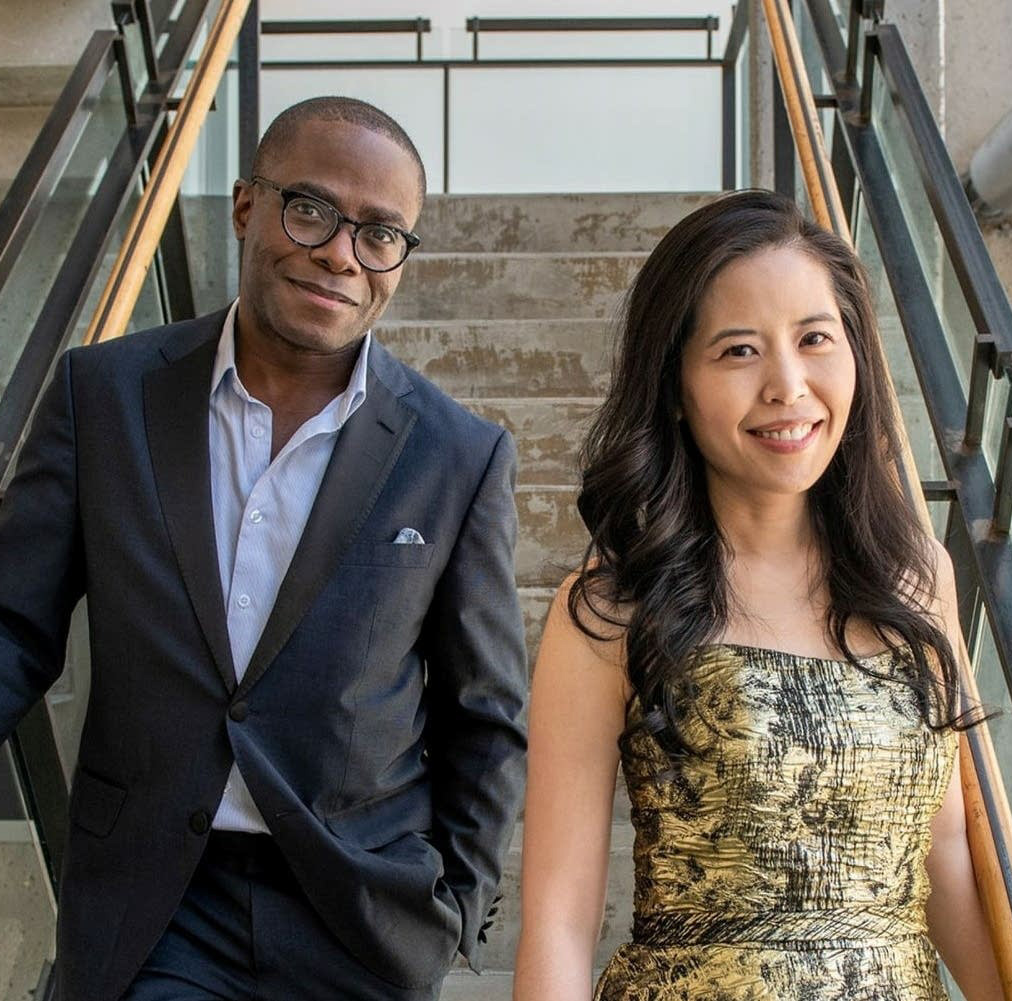The concert is now sold out.
Please click the button below
to add your name to the waitlist.
Hailed for his “trademark brilliance, penetrating sound and rich character” (The New York Times), clarinetist Anthony McGill is one of classical music’s most recognizable and brilliantly multifaceted figures. In addition to his dynamic international solo and chamber music career, McGill is principal clarinet of the New York Philharmonic—the first African-American principal player in the organization’s history.
Pianist Gloria Chien has been picked by The Boston Globe as one of the Superior Pianists of the year, “… who appears to excel in everything.” Richard Dyer praises her for “a wondrously rich palette of colors, which she mixes with dashing bravado and with an uncanny precision of calibration…Chien’s performance had it all, and it was fabulous.”
Anthony McGill
Gloria Chien, Piano
This concert is generously sponsored by
Howard and Celestine Campbell
The concert will be followed by an outdoor reception to help celebrate the conclusion of our 30th season.
Georg Philipp Telemann (1681—1767): Selections from Twelve Fantasies for Solo Clarinet
(arr. Sidney Forrest)
Jessie Montgomery (b. 1981): Peace (2020)
Johannes Brahms (1833—1897): Clarinet Sonata in F minor, Op. 120, No. 1
Allegro appassionato
Andante un poco adagio
Allegretto grazioso
Vivace
Teng Yu-hsien/Stephen Hough (1906—1944 / b. 1961) : Pining for the Spring Breeze
James Lee III (b. 1975) : Ad Anah?
Carl Maria von Weber (1786—1826): Grand Duo Concertant for Clarinet and Piano
Allegro con fuoco
Andante con moto
Rondo: Allegro
Program is subject to change
Selections from 12 Fantasias for Solo Flute……….…Georg Philipp Telemann (1681-1767)
Arr. by Sidney Forrest
Georg Philip Telemann is one of Germany’s most prolific Baroque composers. He studied music against his family’s will and was almost entirely self-taught for most of his life. In addition to a series of 36 harpsichord fantasies, Telemann also composed solo fantasies for flute and violin, a considerable number of concerti for a wide variety of instruments, and over 500 chorale harmonizations.
Highly ornamental and full of technical challenges, this collection of fantasias demonstrates Telemann’s keen mind for melodic invention. When composing for an unaccompanied monophonic instrument, one always runs the risk of a monotonous color or texture. Thankfully this work is full of witty, lush, and exciting melodies that dance around one another. Because Telemann demands significant leaps around the range of the instrument, the player can give the impression that they are performing two melodies at once. The resulting sonic phenomenon is known as a “compound melody,” and it allows the composer to write fugues, a generative process that is usually relegated to polyphonic instruments like the piano or the guitar.
Peace ……………………………………………………….Jessie Montgomery (b. 1981)
Jesse Montgomery is an American composer and violinist from Manhattan’s Lower East Side. She began her violin studies at the Third Street Music School Settlement and founded the award-winning PUBLIQuartet. She holds degrees from the Julliard School of Music and New York University. Montgomery works not only as a composer and violinist, but also as an educator and advocate for underserved communities. The BBC describes her as “one of the most distinctive and communicative voices in the US, as a player and a creator.” Peace was originally commissioned by Victoria Robey OBE for violinist Elena Urioste and pianist Tom Poster.
Montgomery composed this work during the very beginning of the lockdowns caused by COVID-19. The original title of the piece was Melancholy, but she changed the title as she felt that she needed to come to peace with sadness and see it as “a necessary dynamic to the human experience.” Peace was originally composed for violin and piano, but when Anthony McGill heard the piece performed remotely, he immediately emailed Montgomery and asked for an arrangement for clarinet. The wide dynamic range of the clarinet lends itself to the gentle, measured melodic material in this piece.
Clarinet Sonata in F Minor, Op. 120, no. 1 …….………………Johannes Brahms (1833-1897)
- Allegro appassionato
- Andante un poco adagio
III. Allegretto grazioso
- Vivace
Johannes Brahms often spent hours each morning composing short harmonic exercises while he walked around in nature. When he returned home, he would burn everything he had written, and only then would he begin he actual compositional work. It seems that this process refined his ideas and warmed him up to compose more complex pieces. Op. 120 demonstrates this mastery of harmony even at the formal level. The piece begins in F Minor, modulates to Ab major, which shares the same notes at the previous key area, and then finishes in F Major. These harmonic goals maintain a balance between continuity and contrast throughout the piece.
Brahms became fascinated with the tonal color of the clarinet when he heard Carl Maria von Weber’s Clarinet Concerto No. 1. This sonata explores the deep moody low register as well as the piercing chalumeau higher register of the instrument. The first movement is in a fairly strict sonata form, and the second and third movements are also in a ternary (three-part) form, though they do not share the same harmonic plan as a sonata. The final movement is a rondo, or a movement in which a clear melodic idea returns over and over again as new material is interspersed between each refrain. The roles of the clarinet and piano are fairly equal throughout the piece.
Pining for the Spring Breeze ……………Teng Yu-hsien/Steven Hough (1906-1944/b. 1961)
Teng Yu-hsien is a Taiwanese composer of Hakka music, folk music of the Hakka people, a Han Chinese subgroup who originated from northern China. During Teng’s childhood, Taiwan was under Japanese imperial rule. Eventually Teng travelled to Japan to study composition and theory at the Tokyo Music Academy. During the Second World War, many of his songs were banned or translated into Japanese, but in 2006 two Taiwanese astronomers honored the composer’s work by naming an asteroid after him.
Pining for the Spring Breeze is about a young woman who is anxiously waiting for a man to come and marry her. When she hears a knock at the door, she gets excited and runs to open it, only to find the moon laughing at her because it was only the wind. In his arrangement for solo piano, Hough ornaments the folk melody with sweeping pentatonic gestures, moving progressively deeper into the rich middle range of the piano. After reaching for the deepest notes, he returns to the original texture of the music before the melody disappears into nothing.
Ad Anah? ……………………………………………………………………………..James Lee III (b. 1975)
James Lee III is a composer, pianist, and educator who teaches a wide variety of courses at Morgan State University. He has studied under such composers as Susan Botti, who sits on the faculty at the Manhattan School of Music, and celebrated Finnish composer Kaija Saariaho. The music of Lee III has been performed by several major American orchestras, including the Detroit Symphony, the Cincinnati Symphony, and the Baltimore Symphony Orchestra.
The title for this piece translates from Hebrew to “Until When?” Lee III composed the piece for a faculty recital and premiered it with clarinetist and fellow Morgan State professor Allison Yacoub, for whom the music was written. The piece is a musical commentary of lamentation over the violence and injustice observed by the prophet Habakkuk in Israel during the 7th century BCE.
Grand Duo Concertante for Clarinet and Piano, Op. 48
Carl Maria von Weber (1786-1826)
- Allegro con fuoco
- Andante con moto
III. Rondo: Allegro
Carl Maria von Weber was one of the most important figures in German Romantic opera outside of Richard Wagner, so much so that his opera Der Freischütz is often referred to as the first German opera. There is some controversy over precisely who Weber had in mind for this concertante when he first composed it. Some argue that he composed the work for himself and his close friend Heinrich Baermann, a famous German clarinetist, while others claim that the work was intended for Johann Simon Hermstedt.
The piece unfolds over three movements: the first movement is in sonata form and the final movement is a rondo. The second movement is a slower, more tender movement in C minor. Weber was born during the late Classical period in Europe, and his music, like that of Brahms, held on to many of these strict formal plans.
Anthony McGill, clarinet
Hailed for his “trademark brilliance, penetrating sound and rich character” (The New York Times), clarinetist Anthony McGill is one of classical music’s most recognizable and brilliantly multifaceted figures. In addition to his dynamic international solo and chamber music career, McGill is principal clarinet of the New York Philharmonic—the first African-American principal player in the organization’s history. In 2020, he was awarded the Avery Fisher Prize, one of classical music’s most significant awards given in recognition of soloists who represent the highest level of musical excellence.
McGill was honored to take part in the inauguration of President Barack Obama, premiering a piece written for the occasion by John Williams and performing alongside violinist Itzhak Perlman, cellist Yo-Yo Ma, and pianist Gabriela Montero. He is a dedicated champion of new music: during the 2021/22 season, McGill performed You Have the Right to Remain Silent by Pulitzer Prize winning composer Anthony Davis; Peace, by Jessie Montgomery; Ad Anah? by James Lee III; a new work from Benjamin J. Shirley; Book of Days, by Daron Hagen; and From The Mountaintop, written for McGill by Richard Danielpour.
McGill appears regularly as a soloist with top orchestras around North America, including the New York Philharmonic, Metropolitan Opera, Baltimore Symphony Orchestra, San Diego Symphony, and Kansas City Symphony. As a chamber musician, McGill is a favorite collaborator of the Brentano, Daedalus, Guarneri, JACK, Miró, Pacifica, Shanghai, Takács, and Tokyo Quartets, as well as Emanuel Ax, Inon Barnatan, Gloria Chien, Yefim Bronfman, Gil Shaham, Midori, Mitsuko Uchida, and Lang Lang. He has toured with Musicians from Marlboro and regularly performs for the Chamber Music Society of Lincoln Center and the Philadelphia Chamber Music Society. Festival appearances include Tanglewood, Marlboro, Mainly Mozart, and Skaneateles, and the Music@Menlo, Santa Fe, and Seattle Chamber Music Festivals.
A graduate of the Curtis Institute of Music, McGill previously served as the principal clarinet of the Metropolitan Opera and associate principal clarinet of the Cincinnati Symphony Orchestra. He serves on the faculty of The Juilliard School and the Curtis Institute of Music, where he holds the William R. and Hyunah Yu Brody Distinguished Chair. He is the Artistic Director for Juilliard’s Music Advancement Program, a weekend program dedicated to students who demonstrate a commitment to artistic excellence, which actively seeks young musicians from backgrounds underrepresented in classical music.
McGill recorded the Nielsen Clarinet Concerto with Alan Gilbert and the New York Philharmonic. He and his brother, Demarre McGill, the Seattle Symphony Orchestra’s principal flutist, joined the Chicago Youth Symphony Orchestras with conductor Allen Tinkham, to record Winged Creatures, an album of works for flute, clarinet, and orchestra including world-premiere recordings of duo concertos like the title track by African-American composer Michael Abels (Cedille Records). His Portraits, recorded with Demarre McGill and pianist Michael McHale, and Mozart and Brahms Clarinet Quintets, with the Pacifica Quartet, were also released on Cedille Records. In November 2021, Anthony and pianist Gloria Chien released Here With You, an album featuring works by Brahms, Weber, and Montgomery, which the longtime friends and frequent recital collaborators consider to be the most beautiful of all the works they perform (Cedille Records).
McGill has been covered in The New York Times and The New Yorker and has appeared on National Public Radio’s Performance Today, and Mister Rogers’ Neighborhood. He has served as the Artist-in-Residence for WQXR.
In the aftermath of the killing of George Floyd on May 25, 2020, McGill launched a powerful musical protest video urging people to #TakeTwoKnees in demonstration against the death of George Floyd and historic racial injustice. His video went viral, and hundreds of artists and citizens amplified the message and responded to the protest with their own videos using the hashtag #TakeTwoKnees.
McGill is an ardent advocate for helping music education reach underserved communities and for addressing issues of diversity, equity, and inclusion in classical music. In 2020, in concert with a $30,000 charitable gift from the Avery Fisher Artist Program designated to a charity of McGill’s choice, McGill and Weston Sprott, Dean of the Preparatory Division of The Juilliard School, established the Weston Sprott and Anthony McGill MAP Summer Scholarship Fund so MAP students can take part in summer programs and festivals. In December 2021 The Juilliard School announced a permanent endowment grant of $50 million for its Music Advancement Program (MAP) from Crankstart, which will fund full-tuition scholarships for all MAP students and program expansion.
McGill serves on the board of directors for Cedille Records and the Harmony Program, and on the advisory councils for the InterSchool Orchestras of New York and The Time In Children’s Arts Initiative. He is a Vandoren Artist and Buffet Crampon Artist.
Gloria Chien, piano
Pianist Gloria Chien has been picked by The Boston Globe as one of the Superior Pianists of the year, “… who appears to excel in everything.” Richard Dyer praises her for “a wondrously rich palette of colors, which she mixes with dashing bravado and with an uncanny precision of calibration…Chien’s performance had it all, and it was fabulous.”
Gloria made her orchestral debut at the age of 16 with the Boston Symphony Orchestra. Since then, she has appeared as a soloist under the batons of Sergiu Comissiona, Keith Lockhart, Thomas Dausgaard, Irwin Hoffman, Benjamin Zander, and Robert Bernhardt. She is a prize winner of the World Piano Competition, Harvard Musical Association Award, as well as the San Antonio International Piano Competition, where she also received the prize for the Best Performance of the Commissioned Work. Gloria has presented solo recitals at the Isabella Stewart Gardner Museum, Harvard Musical Association, Sanibel Musical Festival, Caramoor Musical Festival, Salle Cortot in Paris, and the National Concert Hall in Taiwan.
An avid chamber musician, Gloria has been the resident pianist with the Chameleon Arts Ensemble of Boston since 2000, a group known for its versatility and commitment to new music. Boston Herald praises her for “ [playing] phenomenally.” Her recent CD with violinist, Joanna Kurkowicz, featuring music of Grazyna Bacewicz was released on Chandos Records. The International Record Review writes, “[the violinist] could ask for no more sensitive or supportive a pianist than Gloria Chien.” Harmonies Magazine writes, “…but it would be unfair not to mention the pianist, who is accompanying the soloist in an absolutely responsive, impressive and confident way. She is more than an accompanist — rather, she is an equivalent partner to the soloist.” The Strad praises her for “super performances…accompanied with great character.” She also received fantastic reviews in Gramophone, American Record Guide, and Muzyka 21. Gloria has participated in such festivals as Chamber Music Northwest, Music Academy of the West, Verbier Music Festival, Bay Chamber Concerts, and Music@Menlo, where she was appointed Director of the Chamber Music Institute in 2010 by Artistic Directors, David Finckel and Wu Han.
Her recent performances include collaborations with the St. Lawrence, Miró, Borromeo, Daedalus and Jupiter String Quartets, David Shifrin, Shmuel Ashkenasi, Joseph Silverstein, Jaime Laredo, Cho-Liang Lin, Ani Kavafian, Ida Kavafian, Wu Han, Rob Kapilow, Paul Neubauer, Roberto Diaz, Andres Diaz, Sharon Robinson, James Ehnes, Nai-Yuan Hu, Bion Tsang, Soovin Kim, Carolin Widmann, Edward Arron and Anthony McGill.
In fall of 2009, Gloria launched String Theory at the Hunter, a chamber music series at the Hunter Museum of American Art in downtown Chattanooga, as its founder and artistic director.
Gloria began playing the piano at the age of five in her native Taiwan. She has a doctor of musical arts, a master’s and an undergraduate degree from the New England Conservatory of Music in Boston. Her teachers have included Russell Sherman and Wha-Kyung Byun. Gloria is an Associate Professor at Lee University in Cleveland, TN, and will be a member of the prestigious Chamber Music Society Two of Lincoln Center starting fall of 2012.
Gloria is a Steinway Artist.




